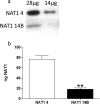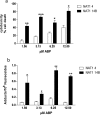Phenotype of the most common "slow acetylator" arylamine N-acetyltransferase 1 genetic variant (NAT1*14B) is substrate-dependent
- PMID: 22010219
- PMCID: PMC3250052
- DOI: 10.1124/dmd.111.041855
Phenotype of the most common "slow acetylator" arylamine N-acetyltransferase 1 genetic variant (NAT1*14B) is substrate-dependent
Abstract
Human arylamine N-acetyltransferase 1 (NAT1) is a phase II cytosolic enzyme responsible for the activation or deactivation of many arylamine compounds including pharmaceuticals and environmental carcinogens. NAT1 is highly polymorphic and has been associated with altered risk toward many cancers. NAT1*14B is characterized by a single nucleotide polymorphism in the coding region (rs4986782; 560G>A; R187Q). NAT1*14B is associated with higher frequency of smoking-induced lung cancer and is the most common "slow acetylator" arylamine NAT1 genetic variant. Previous studies have reported decreased N- and O-acetylation capacity and increased proteasomal degradation of NAT1 14B compared with the referent, NAT1 4. The current study is the first to investigate NAT1*14B expression using constructs that completely mimic NAT1 mRNA by including the 5'- and 3'-untranslated regions, together with the open reading frame of the referent, NAT1*4, or variant, NAT1*14B. Our results show that NAT1 14B is not simply associated with "slow acetylation." NAT1 14B-catalyzed acetylation phenotype is substrate-dependent, and NAT1 14B exhibits higher N- and O-acetylation catalytic efficiency as well as DNA adducts after exposure to the human carcinogen 4-aminobiphenyl.
Figures




References
-
- Adam PJ, Berry J, Loader JA, Tyson KL, Craggs G, Smith P, De Belin J, Steers G, Pezzella F, Sachsenmeir KF, et al. (2003) Arylamine N-acetyltransferase-1 is highly expressed in breast cancers and conveys enhanced growth and resistance to etoposide in vitro. Mol Cancer Res 1:826–835 - PubMed
-
- Ambrosone CB, Abrams SM, Gorlewska-Roberts K, Kadlubar FF. (2007) Hair dye use, meat intake, and tobacco exposure and presence of carcinogen-DNA adducts in exfoliated breast ductal epithelial cells. Arch Biochem Biophys 464:169–175 - PubMed
-
- Bell DA, Stephens EA, Castranio T, Umbach DM, Watson M, Deakin M, Elder J, Hendrickse C, Duncan H, Strange RC. (1995) Polyadenylation polymorphism in the acetyltransferase 1 gene (NAT1) increases risk of colorectal cancer. Cancer Res 55:3537–3542 - PubMed
-
- Bendaly J, Zhao S, Neale JR, Metry KJ, Doll MA, States JC, Pierce WM, Jr, Hein DW. (2007) 2-Amino-3,8-dimethylimidazo-[4,5-f]quinoxaline-induced DNA adduct formation and mutagenesis in DNA repair-deficient Chinese hamster ovary cells expressing human cytochrome P4501A1 and rapid or slow acetylator N-acetyltransferase 2. Cancer Epidemiol Biomarkers Prev 16, 1503–1509 - PMC - PubMed
Publication types
MeSH terms
Substances
Grants and funding
LinkOut - more resources
Full Text Sources

